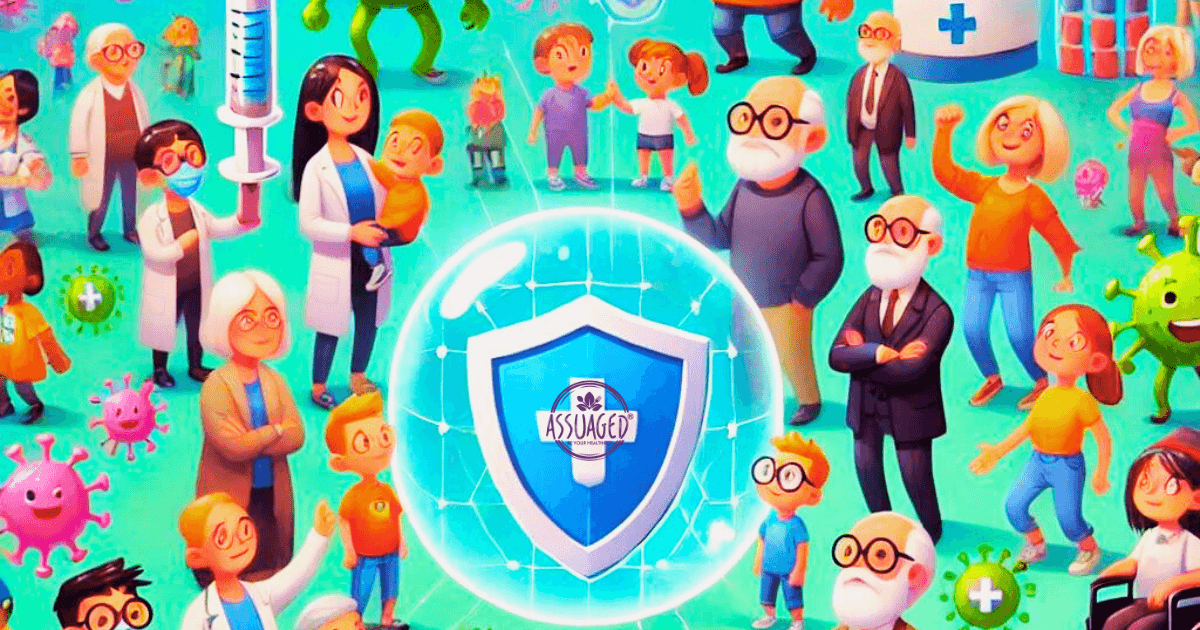Imagine a world where invisible enemies lurk around every corner, ready to strike at any moment. In this high-stakes battle, our greatest allies are vaccinations and the power of herd immunity. As the debate over public health intensifies, understanding these crucial defenses has never been more thrilling—or more essential.
Dive into the fascinating science of vaccines and uncover how these tiny vials of hope shield our communities from devastating outbreaks. From the lab to your local clinic, discover the journey of a vaccine and the incredible impact it has, one shot at a time.
What is Herd Immunity?
Herd immunity, also known as community immunity, occurs when a significant portion of a population becomes immune to a specific disease, either through vaccination or previous infection. This collective immunity reduces the likelihood of disease transmission, thereby protecting individuals who are not immune.
When a large number of people in a community are immune, the disease has fewer opportunities to spread. This is particularly important for protecting vulnerable populations, such as those who cannot be vaccinated due to medical reasons or those with weakened immune systems. Herd immunity can be achieved through natural infection, where individuals recover and develop immunity, or through vaccination, which is a safer and more controlled method of inducing immunity.
The concept of herd immunity is crucial in controlling infectious diseases and preventing outbreaks. For example, diseases like measles and polio have been significantly reduced in many parts of the world due to high vaccination rates, which contribute to herd immunity.[1]
Why Vaccinations Matter
Vaccinations are a safe and effective way to achieve herd immunity without the risks associated with natural infection. They help prevent the spread of contagious diseases by creating immunity within the population, reducing the likelihood of disease transmission, and protecting those who cannot be vaccinated, such as infants, the elderly, or immunocompromised individuals. Even if a vaccinated person contracts the disease, the severity and duration of the illness are often significantly reduced, leading to fewer complications, hospitalizations, and deaths. Vaccinations are also a cost-effective public health measure, as the cost of vaccinating a population is much lower than treating widespread outbreaks. They have led to the eradication or near-eradication of several deadly diseases, such as smallpox and polio, and continued efforts can potentially eliminate other diseases in the future. By vaccinating today, we protect future generations from diseases that once caused significant morbidity and mortality, leading to healthier communities and a reduction in the overall disease burden. Achieving herd immunity through vaccination means that even those who cannot be vaccinated are protected, preventing outbreaks and safeguarding vulnerable populations. Vaccines undergo rigorous testing and monitoring to ensure they are safe and effective, with the benefits of vaccination far outweighing the minimal risks associated with vaccines[2] .
- Preventing Disease Outbreaks: Vaccines help prevent the spread of contagious diseases like measles, polio, and chickenpox. When a significant portion of the population is vaccinated, it reduces the likelihood of outbreak.
- Protecting Vulnerable Populations: Not everyone can get vaccinated. Newborns, elderly individuals, and those with weakened immune systems rely on herd immunity for protection. By getting vaccinated, you help shield these vulnerable groups from potentially life-threatening diseases
- Building Long-Term Immunity: Vaccines expose your body to a weakened or killed form of the pathogen, prompting your immune system to develop antibodies. This prepares your body to fight off the disease if exposed in the future.

The Role of Public Trust
Building trust in vaccination programs is vital for achieving herd immunity, which protects the entire community, including those who cannot be vaccinated due to medical reasons. Public health campaigns that highlight the dangers of not getting vaccinated, such as the resurgence of preventable diseases, can be more effective than those that only emphasize the benefits of vaccination. These campaigns should include real-life stories and data to illustrate the severe consequences of vaccine-preventable diseases.
Ensuring accurate information is disseminated through reliable sources helps counteract misinformation and myths about vaccines. Addressing vaccine hesitancy involves understanding the concerns and fears of individuals and providing clear, evidence-based responses. Engaging with communities, healthcare providers, and influencers can also play a crucial role in fostering public confidence in vaccination programs. By taking these steps, we can work towards a healthier, more protected society.
Conclusion
Reducing the healthcare burden through widespread vaccination is crucial for maintaining a robust and efficient healthcare system. When a large portion of the population is vaccinated, the incidence of vaccine-preventable diseases decreases significantly. This reduction in illness means fewer people require medical attention, hospitalizations, and intensive care, thereby lessening the strain on healthcare systems.
With fewer patients to treat for preventable diseases, healthcare providers can allocate their resources more effectively. This allows them to focus on other critical areas, such as treating chronic conditions, managing emergencies, and conducting preventive care. Additionally, it helps in reducing healthcare costs associated with treating outbreaks and managing complications from preventable diseases.
Moreover, widespread vaccination contributes to the overall health and well-being of the community, leading to a more productive society. By preventing the spread of infectious diseases, we can ensure that healthcare systems remain resilient and capable of addressing a wide range of health issues. This holistic approach ultimately leads to better health outcomes and a more sustainable healthcare infrastructure[3] .














